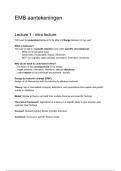EMB aantekeningen
Lecture 1 - intro lecture
“We need to understand behavior to be able to Change behavior of our user”
What is behavior?
The way we act in a specific situation and under specific circumstances
- What we do (physical acts)
- Observable, measurable, impact, influences
- NOT: our cognitive state (mindset, perception, motivation, emotions)
Why do we need to understand it first?
… be aware of the consequences of our design
… target behavior, motivation, intentions, attitude effectively
… make impact on the individual/ environment / society
Design for behavior change (DfBC)
Design of an intervention with the intention to influence behavior
Theory: Set of interrelated concepts, definitions, and propositions that explain and predict
events or situations
Model: Similar to theory, but build from multiple theories and scientific findings
Theoretical framework: Application of a theory in a specific study to give direction and
organize idea/ findings
Concept: Abstract building blocks (multiple theories)
Construct: Concept in specific theory/ model
, Lecture 2 - individual factors
Individual factors - cognition and cognitive processes
- Process for knowledge/ understanding through thoughts
- Relationship between thoughts and behavior
- Characteristics, thoughts, beliefs, motivations, attitude, perception
Intuition & instinct = 95% of our decision making
Rationale thinking = 5% of our decision making → you really have to switch this on
Cognitive biases = a systematic error in thinking that impacts one’s choices and
judgements
Trait & State
Trait: your character, what makes you different from others. Influences your thoughts,
feelings and behavior
State: “I am a confident person” vs “I am confident for this exam”
Most concepts related to behavior are dynamic → We can change them through design
Assignment:
Exploration of factors
- Decision making & personality
- Motivation
- Process that guides goal-oriented behavior
- Gives behavior its energy and direction
- To start, execute and maintain behavior
- Affective motivators (emotion) → sadness, joy, fear, anger
- Biological motivators (survival) → thirst, hunger, sex
- Psychological motivators → autonomy, competence, relatedness
- Intention, Attitude, Perceived control
Mood & Reflect
- When you are tired/ alone or happy and motivated




